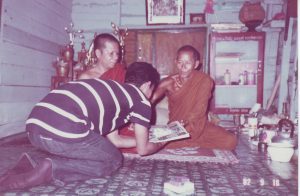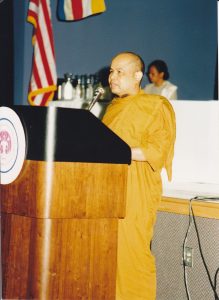Memo #185
By Ian G. Baird – ibaird [at] wisc.edu
 Many, especially outside Asia, are under the mistaken impression that Buddhists are inherently non-violent, especially in comparison with other world religions such as Christianity and Islam. Despite this impression, violence is often linked with Buddhism and perpetrated by Buddhists. Monks in Theravada lineages are not allowed to directly engage in violence, but some have become involved with militancy. Although I am unaware of any Lao monks who have directly participated in violent acts, a few have been shot in Thailand by those opposed to them for providing support to insurgents. This indicates that their support is perceived as substantial and significant.
Many, especially outside Asia, are under the mistaken impression that Buddhists are inherently non-violent, especially in comparison with other world religions such as Christianity and Islam. Despite this impression, violence is often linked with Buddhism and perpetrated by Buddhists. Monks in Theravada lineages are not allowed to directly engage in violence, but some have become involved with militancy. Although I am unaware of any Lao monks who have directly participated in violent acts, a few have been shot in Thailand by those opposed to them for providing support to insurgents. This indicates that their support is perceived as substantial and significant.
The Thai Theravada Buddhist monk, Kittivuddho, famously stated in 1976 that it was not a sin to kill a communist. Militant monks in Sri Lanka and Burma have been covered by international media. But much less is known about the role of ethnic Lao Buddhist monks in supporting militant violence directed against the communist Lao People’s Democratic Republic government and their Vietnamese allies since 1975.
Some Lao monks have refused to assist insurgents directly, but a number have provided food, shelter, and medicine to insurgents and their families. Others have helped raise funds for insurgents. Some have provided spiritual support, including providing insurgents with protective charms. A few have even given advice designed to directly assist in military operations. Some monks have justified providing material support to insurgents by arguing that it is “humanitarian,” and thus permitted by Buddhist (vinaya) monastic rules. In a similar vein, some claim that they “never told them to use the money to buy weapons” – again remaining within the letter of the vinaya. Clearly, there are various views about what constitutes appropriate practice, and not surprisingly, Buddhist doctrine is not always interpreted in the same ways.
Many have justified their support for insurgents on nationalist grounds, and some have presented themselves as being a positive influence by urging militant insurgents to not commit atrocities against “innocent people.” Some monks have relaxed their observance of Buddhist practice due to “exceptional circumstances” – circumstances which these monks believe threaten the Lao nation and even Lao Buddhism itself. Nationalistic concerns sometimes dominate.
About the Author:
Dr. Ian G. Baird is an Assistant Professor of Geography at the University of Wisconsin-Madison who has lived in Thailand and Laos for most of the past 25 years.
Links:
- Buddhism and Violence: Militarism and Buddhism in Modern Asia, 2012. (By Ian G. Baird). Full text here.
- Lao Buddhist Monks’ Involvement in Political and Military Resistance to the Lao People’s Democratic Republic Government since 1975, 2012. (By Ian G. Baird). Full text here.

